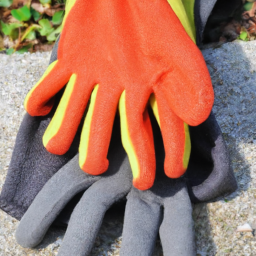Cleaning Gardening Gloves How To
Table of Contents []
How To Clean Gardening Gloves
Introduction
Gardening has taken a renewed interest among the general population as a popular pastime. Depending on the level of activity, contaminated gloves can easily become part of the experience. Clean gloves improve the experience by enhancing hand grip while minimizing the risk of spreading or acquiring infection through contact with soil or foliage. This guide presents the primary steps and materials required for cleaning and maintaining gardening gloves.
Primary Threads
1. When to deep-clean?
2. Separate components and parts
3. Considerable materials
4. Soap & Foam for deep washing
5. Gently scrub & rinse
6. Functional drying
7. Special drying techniques
8. Safe storage & maintenance
9. Special cleaners & techniques
When to Deep-Clean?
Gardening gloves require regular cleaning to maintain their traction and filtering properties. Aside from Peak Season when gloves can take on more wear, it's best to clean a pair of gloves after every use to ensure the filtering properties remain intact. Gloves that come into contact with mud, compost, rainstorms, or fertilizers should be deep-cleaned after exposure.
Separate Components and Parts
Depending on the model, gloves may have interchangeable parts or components. Before beginning to clean the gloves, it's important to disassemble each component and inspect it for potential damage. Replaceable cuffs, strap, Velcro, buckles, and padded panels, while a traditional pair of gloves with thick, flexible fabric can be handled the same way for most parts.
Considerable Materials
To prepare for deep-cleaning gardening gloves, items such as a soft sponge, mild detergents, or specially designed cleaning solutions can be used. Distilled white vinegar, for example, is an excellent cleaner that is low-cost and safe to use around plants. For gloves with specialized components, benzene-derivatives can be used.
Soap & Foam for Deep Washing
The absorbent properties of soap create an ideal solution for cleaning the range of wastes, residue, and grime that can accumulate on gloves. Specialized cleaning solutions or foam are also available from garden and home improvement stores, and provide excellent cleaning that is especially beneficial for tough spots or large areas of waste.
Gently Scrub & Rinse
When the solution is prepared, gloves require gentle scrubbing and washing with the solution. Care should be taken to ensure the fabric panels are adequately cleaned, including the interior sections. Gloves should be chosen for their durability and treated gently to extend their lifespan.
Functional Drying
After cleaning, gloves must be dried adequately to prevent damage to the textile fibers. Drying this way prevents mold or mildew from forming in places that have been exposed to water and moisture. Ideally, gloves should be washed near the garden or an outdoor area and dried in the sun or inside using a fan.
Special Drying Techniques
When necessary, gloves can also be dried in a washing machine with a low-heat setting or a tumble-dryer at low-heat. Glove parts can be dried as well, but specialized bags will protect them from abrasions or damage from tumbling. Gloves should also be dried away from direct heat sources, as high temperatures can cause material shrinkage or discoloration.
Safe Storage & Maintenance
Once gloves are clean and dry, they need to be stored away from direct sunlight or heat sources. Shelves, drawers, cupboards, or bins are excellent storage options. Aside from regular cleaning and maintenance, gloves should also be checked for signs of wear or damage on a regular basis to ensure maximum performance.
Special Cleaners & Techniques
Aside from specialized cleaning solutions, special cleaners such as peroxide, dish soap, and even rubbing alcohol can be used. Some manufacturers provide specialized products that provide enhanced cleaning results. Glove styles such as protective, waterproof, and all-weather have specialized techniques and products too.
In Summary
The maintenance of gardening gloves is essential for improved hand-grip and general comfort. With suitable detergents, solutions, or specialized cleaners, gloves can maintain their softness and ability to protect and filter against bacteria and other contaminants in the soil and foliage. With this guide in-hand, gloves can last multiple seasons while helping maintain a healthy, enjoyable gardening experience.

Previous Page
